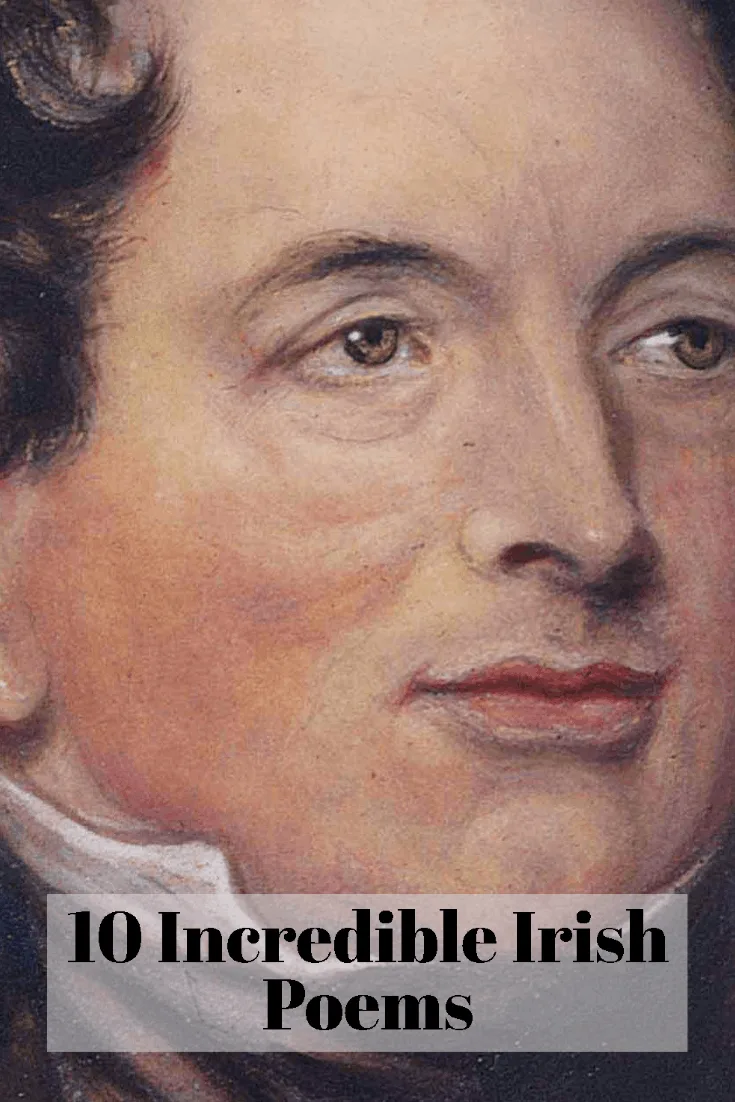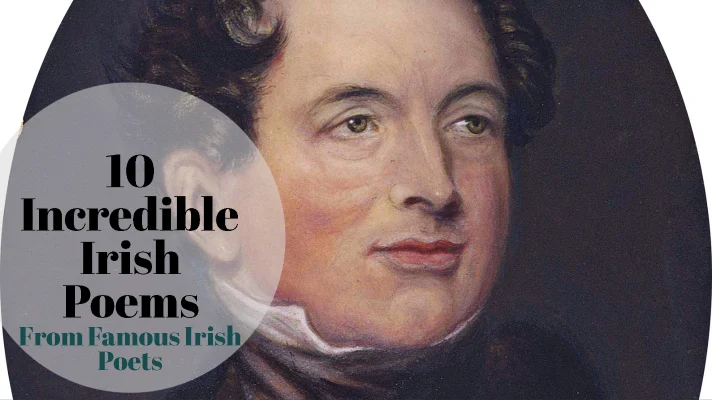Ireland has many famous Irish poets. In last weeks post, I shared this incredible 200-year-old poem from James Orr.
From ancient Celtic symbols to famous Irish poets we have a wide diversity of rich heritage.
Today I wanted to share 10 incredible Irish poems from famous Irish poets.
Believe me, it is not easy to pick 10 poems. Once you start looking in different Irish poets the list just goes on and on and on.
There are so many beautiful Irish poems that I could be here all day sharing them with you.
Frankly choosing just great Irish poems was a challenge. I have included the whole poem so take your time going through them.
But let’s get to it. I have actually shared the entire poem in this post. Give them a read through and be sure to hit that share button.
10.Top Irish Poets – Padraic Colum( (8 December 1881 – 11 January 1972) “An Old Woman of the Roads”
Padraic Colum was an Irish poet, novelist, dramatist, biographer, playwright, children’s author and collector of folklore. He was one of the leading figures of the Irish Literary Revival.
O, to have a little house!
To own the hearth and stool and all!
The heaped up sods upon the fire,
The pile of turf against the wall!To have a clock with weights and chains
And pendulum swinging up and down!
A dresser filled with shining delph,
Speckled and white and blue and brown!I could be busy all the day
Clearing and sweeping hearth and floor,
And fixing on their shelf again
My white and blue and speckled store!I could be quiet there at night
Beside the fire and by myself,
Sure of a bed and loth to leave
The ticking clock and the shining delph!Och! but I’m weary of mist and dark,
And roads where there’s never a house nor bush,
And tired I am of bog and road,
And the crying wind and the lonesome hush!And I am praying to God on high,
And I am praying Him night and day,
For a little house – house of my own –
Out of the wind’s and the rain’s way.
9. Top Irish Poets – Patrick Kavanagh(21 October 1904 – 30 November 1967) – “On Raglan Road”
Patrick Kavanagh was an Irish poet and novelist. His best-known works include the novel Tarry Flynn, and the poems “On Raglan Road” and “The Great Hunger”. He is known for his accounts of Irish life through reference to the everyday and commonplace. He also played as a goalkeeper for his local Gaelic football club.
On Raglan Road on an autumn day I met her first and knew
That her dark hair would weave a snare that I might one day rue;
I saw the danger, yet I walked along the enchanted way,
And I said, let grief be a fallen leaf at the dawning of the day.On Grafton Street in November we tripped lightly along the ledge
Of the deep ravine where can be seen the worth of passion’s pledge,
The Queen of Hearts still making tarts and I not making hay –
O I loved too much and by such and such is happiness thrown away.I gave her gifts of the mind I gave her the secret sign that’s known
To the artists who have known the true gods of sound and stone
And word and tint. I did not stint for I gave her poems to say.
With her own name there and her own dark hair like clouds over fields of MayOn a quiet street where old ghosts meet I see her walking now
Away from me so hurriedly my reason must allow
That I had wooed not as I should a creature made of clay –
When the angel woos the clay he’d lose his wings at the dawn of day.
8. Top Irish Poets – Thomas Moore (28 May 1779 – 25 February 1852) – “The Last Rose Of Summer”
Thomas Moore was an Irish writer, poet and lyricist celebrated for his Irish Melodies. Their setting of English-Language verse to old Irish tunes marked the transition in popular Irish culture from Irish to English.
‘Tis the last rose of Summer,
Left blooming alone;
All her lovely companions
Are faded and gone;
No flower of her kindred,
No rose-bud is nigh,
To reflect back her blushes
Or give sigh for sigh!I’ll not leave thee, thou lone one,
To pine on the stem;
Since the lovely are sleeping,
Go sleep thou with them.
Thus kindly I scatter
Thy leaves o’er the bed
Where thy mates of the garden
Lie scentless and dead.So soon may I follow,
When friendships decay,
And from Love’s shining circle
The gems drop away!
When true hearts lie withered,
And fond ones are flown,
Oh! who would inhabit
This bleak world alone?
7. Top Irish Poets – Oscar Wilde(16 October 1854 – 30 November 1900) – “Requiescat”
Oscar Fingal O’Flahertie Wills Wilde was an Irish poet and playwright. After writing in different forms throughout the 1880s, the early 1890s saw him become one of the most popular playwrights in London.
Tread lightly, she is near
Under the snow,
Speak gently, she can hear
The daisies grow.All her bright golden hair
Tarnished with rust,
She that was young and fair
Fallen to dust.Lily-like, white as snow,
She hardly knew
She was a woman, so
Sweetly she grew.Coffin-board, heavy stone,
Lie on her breast,
I vex my heart alone
She is at rest.Peace, Peace, she cannot hear
Lyre or sonnet,
All my life’s buried here,
Heap earth upon it
6. Top Irish Poets – Katharine Tynan (23 January 1859 – 2 April 1931) – “A Hero”
Katharine Tynan was an Irish writer, known mainly for her novels and poetry. After her marriage in 1898 to the Trinity College scholar, writer and barrister Henry Albert Hinkson she usually wrote under the name Katharine Tynan Hinkson, or variations thereof.
He was so foolish, the poor lad,
He made superior people smile
Who knew not of the wings he had
Budding and growing all the while;
Nor that the laurel wreath was made
Already for his curly head.Silly and childish in his ways;
They said: ‘His future comes to naught.’
His future! In the dreadful days
When in a toil his feet were caught
He hacked his way to glory bright
Before his day went down in night.He fretted wiser folk–small blame!
Such futile, feeble brains were his.
Now we doff hats to hear his name,
Ask pardon where his spirit is,
Because we never guessed him for
A hero in the disguise he wore.It matters little how we live
So long as we may greatly die.
Fashioned for great things, O forgive
Our dullness in the days gone by!
Now glory wraps you like a cloak
From us, and all such common folk.
5. Top Irish Poets –Patrick Kavanagh(21 October 1904 – 30 November 1967) – “Stony Grey Soil”
O stony grey soil of Monaghan
The laugh from my love you thieved;
You took the gay child of my passion
And gave me your clod-conceived.You clogged the feet of my boyhood
And I believed that my stumble
Had the poise and stride of Apollo
And his voice my thick tongued mumble.You told me the plough was immortal!
O green-life conquering plough!
The mandril stained, your coulter blunted
In the smooth lea-field of my brow.You sang on steaming dunghills
A song of cowards’ brood,
You perfumed my clothes with weasel itch,
You fed me on swinish foodYou flung a ditch on my vision
Of beauty, love and truth.
O stony grey soil of Monaghan
You burgled my bank of youth!Lost the long hours of pleasure
All the women that love young men.
O can I stilll stroke the monster’s back
Or write with unpoisoned pen.His name in these lonely verses
Or mention the dark fields where
The first gay flight of my lyric
Got caught in a peasant’s prayer.Mullahinsa, Drummeril, Black Shanco-
Wherever I turn I see
In the stony grey soil of Monaghan
Dead loves that were born for me.
4. Top Irish Poets – Eileen Carney Hulme(1953 – present) “Belonging”
We never really slept,
just buried clocks
in the sanctuary
of nightevery time I moved
you moved with me,
winged eyelashes
on your cheek returns a kisssmall spaces of silence
in between borrowed breaths
arms tighten
at the whisper of a nameall the words of the heart
the unanswered questions
are at this moment
blue rolling wavestonight our souls rest
fragrant in spiritual essence
candle-flamed, undamaged
utterly belonging.
3. W. B. Yeats(13 June 1865 – 28 January 1939) – “The Lake Isle of Innisfree”
William Butler Yeats was an Irish poet and one of the foremost figures of 20th-century literature. A pillar of the Irish literary establishment, he helped to found the Abbey Theatre, and in his later years served two terms as a Senator of the Irish Free State.
I will arise and go now, and go to Innisfree,And a small cabin build there, of clay and wattles made;Nine bean-rows will I have there, a hive for the honey-bee,And live alone in the bee-loud glade.And I shall have some peace there, for peace comes dropping slow,Dropping from the veils of the morning to where the cricket sings;There midnight’s all a glimmer, and noon a purple glow,And evening full of the linnet’s wings.I will arise and go now, for always night and dayI hear lake water lapping with low sounds by the shore;While I stand on the roadway, or on the pavements grey,I hear it in the deep heart’s core.
2. W. B. Yeats – Easter, 1916
I have met them at close of dayComing with vivid facesFrom counter or desk among greyEighteenth-century houses.I have passed with a nod of the headOr polite meaningless words,Or have lingered awhile and saidPolite meaningless words,And thought before I had doneOf a mocking tale or a gibeTo please a companionAround the fire at the club,Being certain that they and IBut lived where motley is worn:All changed, changed utterly:A terrible beauty is born.That woman’s days were spent
In ignorant good-will,Her nights in argumentUntil her voice grew shrill.What voice more sweet than hersWhen, young and beautiful,She rode to harriers?This man had kept a schoolAnd rode our wingèd horse;This other his helper and friendWas coming into his force;He might have won fame in the end,So sensitive his nature seemed,So daring and sweet his thought.This other man I had dreamedA drunken, vainglorious lout.He had done most bitter wrongTo some who are near my heart,Yet I number him in the song;He, too, has resigned his partIn the casual comedy;He, too, has been changed in his turn,Transformed utterly:A terrible beauty is born.Hearts with one purpose aloneThrough summer and winter seemEnchanted to a stoneTo trouble the living stream.The horse that comes from the road,The rider, the birds that rangeFrom cloud to tumbling cloud,Minute by minute they change;A shadow of cloud on the streamChanges minute by minute;A horse-hoof slides on the brim,And a horse plashes within it;The long-legged moor-hens dive,And hens to moor-cocks call;Minute by minute they live:The stone’s in the midst of all.Too long a sacrificeCan make a stone of the heart.O when may it suffice?That is Heaven’s part, our partTo murmur name upon name,As a mother names her childWhen sleep at last has comeOn limbs that had run wild.What is it but nightfall?No, no, not night but death;Was it needless death after all?For England may keep faithFor all that is done and said.We know their dream; enoughTo know they dreamed and are dead;And what if excess of loveBewildered them till they died?I write it out in a verse—MacDonagh and MacBrideAnd Connolly and PearseNow and in time to be,Wherever green is worn,Are changed, changed utterly:A terrible beauty is born.
1. Seamus Heaney(13 April 1939 – 30 August 2013) – ” Mid-Term Break”
Seamus Justin Heaney MRIA was an Irish poet, playwright and translator. He received the 1995 Nobel Prize in Literature. Among his best-known works is Death of a Naturalist, his first major published volume.
I sat all morning in the college sick bayCounting bells knelling classes to a close.At two o’clock our neighbours drove me home.In the porch I met my father crying—He had always taken funerals in his stride—And Big Jim Evans saying it was a hard blow.The baby cooed and laughed and rocked the pramWhen I came in, and I was embarrassedBy old men standing up to shake my handAnd tell me they were ‘sorry for my trouble’.Whispers informed strangers I was the eldest,Away at school, as my mother held my handIn hers and coughed out angry tearless sighs.At ten o’clock the ambulance arrivedWith the corpse, stanched and bandaged by the nurses.Next morning I went up into the room. SnowdropsAnd candles soothed the bedside; I saw himFor the first time in six weeks. Paler now,Wearing a poppy bruise on his left temple,He lay in the four-foot box as in his cot.No gaudy scars, the bumper knocked him clear.A four-foot box, a foot for every year.


